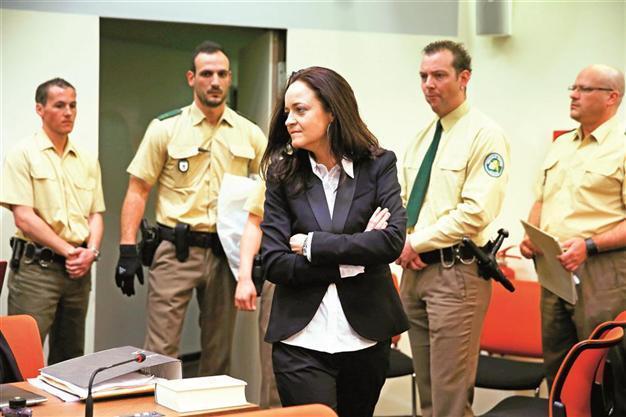German neo-Nazi trial starts in Munich
MUNICH

Beate Zschaepe, a member of the neo-Nazi group National Socialist Underground (NSU) stands in the court before the start of her trial as protesters rallies outside the courthouse in Munich. REUTERS photo
The trial of a neo-Nazi suspected of involvement in the killings of 10 people between 2000 and 2007, most of them Turks, opened today in Munich.Under a heavy police presence, Beate Zschaepe, 38, entered the court in the southern German city of Munich, appearing relaxed in a trim black trouser suit and with her arms folded, while dozens of anti-racist protesters rallied outside.
In November 2011, Germany was shocked to learn that a group calling itself the National Socialist Underground (NSU) had claimed responsibility for the murders of eight Turks, a Greek shopkeeper and a German policewoman between 2000 and 2007.
Anger was stoked by a failure to home in on the killers for more than a decade, and an admission that files had been shredded that could have helped the investigation. Chancellor Angela Merkel has called the killings a “disgrace” for her country and apologized for the fact that suspicion had fallen on some victims’ relatives, which she called “particularly tormenting.”
The focus of the trial will be a 38-year-old woman, Beate Zschaepe, accused of being an NSU founding member and of involvement in the murders. She is also accused of involvement in 15 armed robberies, arson and attempted murder in two bomb attacks, and faces life in prison if convicted. Four suspected male accomplices are also on trial.
Police say the suspects had the direct or indirect assistance of 129 people, proof that the NSU trio were not “lone wolves.” Nearly all the alleged accomplices had ties to the neo-Nazi National Democratic Party of Germany, which the nation’s 16 states are trying to have banned by the country’s top court.
Turkey seeks fair judgement
Turkish Deputy Prime Minister Bekir Bozdağ said Turkey seeks a fair judgment from the court. “We seek criminals to be punished, the truth to be revealed and an objective judgment from the court,” Bozdağ said. Reminding the court chief’s past statements, Bozdağ said: “We wish that the past statements and decisions of the court chief would not affect the trial’s decision.”
The deputy prime minister said last month the trial did not have any significance anymore for Turkey since the result was pre-determined, claiming that the court chief had lost its neutrality.
The court room is small and no video transmission of proceedings is allowed. The head of Germany’s internal security services has warned against expectations that the trial will shed a lot of light on the chapter. Even if many answers are forthcoming, it is not certain “that we will have complete clarity about the NSU in the end,” Hans Georg Maassen recently told the Frankfurter Rundschau. The landmark trial also stoked controversy long before its start over an ongoing row centered on the accreditation of journalists.
As most of the victims originated from Turkey, it is expected to be intensely scrutinized beyond Germany’s borders. But the court initially failed to guarantee Turkish media seats at the hearings when it handed out reserved spots on a first-come, first-served basis. This strained German-Turkish ties and forced a last-minute postponement when Germany’s top court ordered it to allocate seats to foreign reporters.
A hastily organized re-run of the accreditation process, where 50 media organizations were chosen in a lottery, has failed to calm the waters. Daily Hürriyet, Sabah, Evrensel, private broadcaster Ebru TV, Al-Jazeera Turk and İhlas News Agency are the press institutions from Turkey that will follow the case. Turkish media now have four seats, alongside a raft of leading German newspapers and international news agencies such as Agence France-Presse, The Associated Press and Reuters.
















